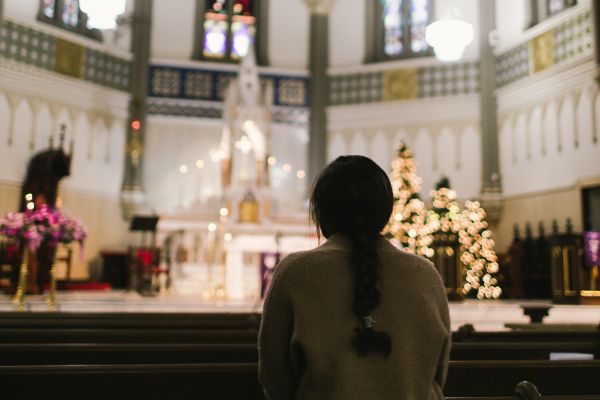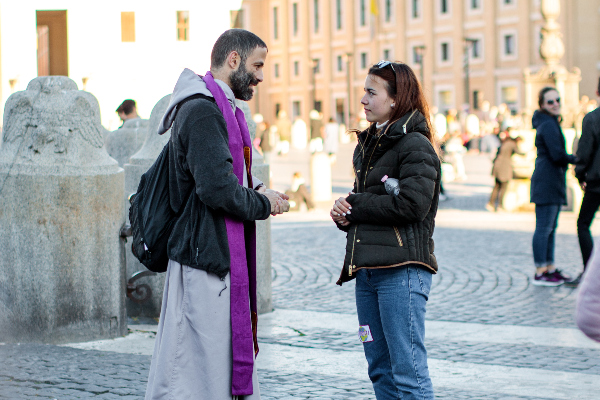At the surface level, fasting from food, like Catholics do each Ash Wednesday and Good Friday, can appear to be a strange, backwards practice with no clear benefit. While periodically skipping a meal or two might help take a few pounds off, the discipline of fasting doesn’t appear to be “spiritual” in any way.
Not only that, it’s easy to forget sometimes that you’re supposed to fast or abstain from meat!
There have been countless times when I have been visiting a friend’s house or going out to a restaurant and have either forgotten entirely about abstaining from meat, or sunk my teeth into a juicy steak, remembering in the middle of my bite that it’s a Friday!
Does the Church make up these rules just to play cruel games with us?

The answer to that question goes all the way back to the book of Genesis.
Did you know that one of God’s first instructions to humans involved abstaining from a certain food? If we open the book of Genesis, we see God explaining to Adam and Eve all the food they can eat, except for a single tree they must avoid.
“You may freely eat of every tree of the garden; but of the tree of the knowledge of good and evil you shall not eat, for in the day that you eat of it you shall die.” (Genesis 2:16-17)
Doesn’t that sound familiar? You can eat any type of food on the menu, but on Fridays you can’t eat meat!
Isn’t it interesting how the first “test” from God involved abstaining from the fruit of a single tree?
Tertullian, a Christian writer from the 3rd century, had some choice words for Adam in his letter On Fasting.
“Adam had received from God the law of not tasting of the tree of the knowledge of good and evil … [instead Adam] yielded more readily to his belly than to God, heeded the meat rather than the mandate, and sold salvation for his gullet!”
Pope Benedict XVI reflected on this theme in his Lenten message in 2009, explaining how, “Since all of us are weighed down by sin and its consequences, fasting is proposed to us as an instrument to restore friendship with God…If, therefore, Adam disobeyed the Lord’s command ‘of the tree of the knowledge of good and evil you shall not eat,’ the believer, through fasting, intends to submit himself humbly to God, trusting in His goodness and mercy.”
Have you ever thought of fasting and abstinence as a way to restore your friendship with God?
Through fasting and abstinence, we can show God that we want to draw closer to him and that we trust his plan for our lives.
It can take a good dose of humility to recognize that God’s ways are better than our ways, especially when we don’t understand them.
God didn’t tell Adam and Eve to abstain from the fruit of a single tree for no particular reason. He wanted to show them the path to true and lasting happiness, which involves trust and obedience to God.
We need to learn to trust that God knows us better than we know ourselves and seeks our ultimate good. He isn’t out to “get us,” or intentionally “trip us up.” Instead, he wants to invite us into a deeper relationship, one that is firmly rooted in trust.
Not only can fasting and abstinence help us draw closer to God, they can also lead to freedom, a freedom you may have never thought possible.

Too often we can become “enslaved” to food, or other pleasures, whether we realize it or not. Certain foods, or food in general, can have power over us, and if we aren’t careful we can end up indulging in habits of eating that endanger our health as well as our spiritual well-being.
Furthermore, when we fast for a certain time, or abstain from particular foods (like sweets or meat for example), we take control over the situation and develop the ability to say no. That is a powerful ability that fasting and abstinence can unlock for us, leading to true spiritual freedom.
This ability to say no to something as simple as meat can help us stop other, more harmful habits in our lives. Through fasting and abstinence, we can prepare ourselves to say no to pornography, gossip, or cheating on our next exam.
Every sin is rooted in disobedience to God and a grasping of a “fruit” we desire. The difficulty for us lies in saying no to that temptation, and fasting and abstinence can help us deny those fruits in favor of the happiness God promises to us.
The next time you fast or abstain from particular foods, don’t look at it as something “negative” that prevents you from having fun. Instead, look at it as an invitation to freedom and a more personal relationship with Jesus Christ.
Here is the USCCB’s guide to fasting and abstinence.
